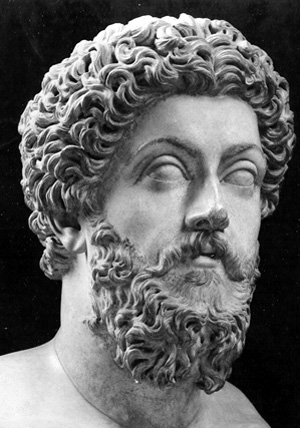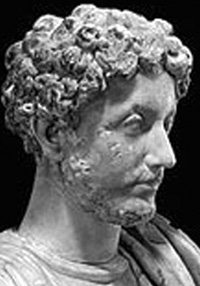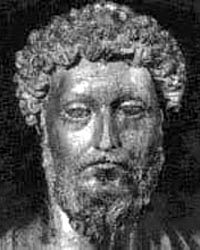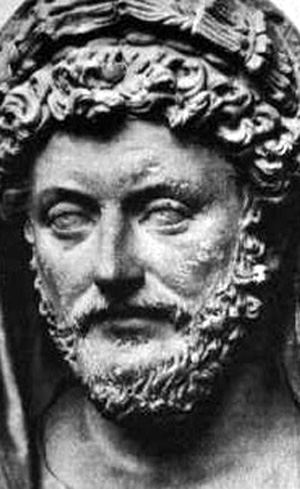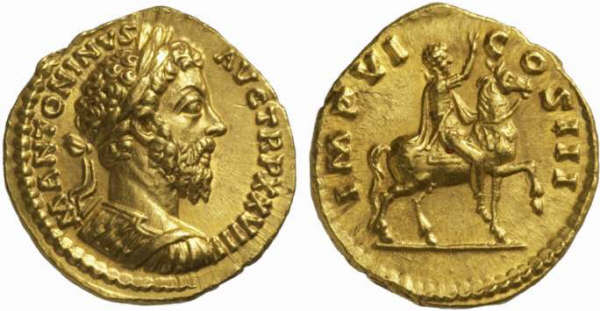Copyright Michael D. Robbins 2006
Astro-Rayological
Interpretation & Charts
Quotes
Biography
Images and Physiognomic Interpretation
Marcus Aurelius wrote Meditations (AD 167). Meditations explains how the moral life leads to tranquillity. Marcus stresses the virtues of wisdom, justice, fortitude, and moderation. He recommended opium-eating for headache, dizziness, epilepsy, asthma, fever, leprosy and other ills of the flesh.
All is ephemeral,--fame and the famous as well.
Accept the things to which fate binds you, and love the people with whom fate brings you together, but do so with all your heart.
Never let the future disturb you. You will meet it, if you have to, with the same weapons of reason which today arm you against the present.
When you arise in the morning, think of what a precious privilege it is to be alive - to breathe, to think, to enjoy, to love.
Anything in any way beautiful derives its beauty from itself and asks nothing beyond itself. Praise is no part of it, for nothing is made worse or better by praise.
How much more grievous are the consequences of anger than the causes of it.
Remember this -- very little is needed to make a happy life.
If you are distressed by anything external, the pain is not due to the thing itself, but to your estimate of it; and this you have the power to revoke at any moment.
It is the act of a madman to pursue impossibilities.
Look well into thyself; there is a source of strength which will always spring up if thou wilt always look there.
Remember this-that there is a proper dignity and proportion to be observed in the performance of every act of life.
The happiness of your life depends upon the quality of your thoughts, therefore guard accordingly; and take care that you entertain no notions unsuitable to virtue, and reasonable nature.
By a tranquil mind I mean nothing else than a mind well ordered.
How much time he gains who does not look to see what his neighbor says or does or thinks, but only at what he does himself, to make it just and holy.
In the morning, when you are sluggish about getting up, let this thought be present: 'I am rising to a man's work.'
Never esteem anything as of advantage to you that will make you break your word or lose your self-respect.
Nothing happens to any thing which that thing is not made by nature to bear.
Nothing happens to anybody which he is not fitted by nature to bear.
The universe is change; our life is what our thoughts make it.
Think not disdainfully of death, but look on it with favor; for even death is one of the things that Nature wills.
Very little is needed to make a happy life.
Whatever is in any way beautiful hath its source of beauty in itself, and is complete in itself; praise forms no part of it. So it is none the worse nor the better for being praised.
You will find rest from vain fancies if you perform every act in life as though it were your last.
Never let the future disturb you. You will meet it, if you have to, with the same weapons of reason which today arm you against the present.
Waste no more time talking about great souls and how they should be. Become one yourself!
Be not careless in deeds, nor confused in words, nor rambling in thought.
What is not good for the swarm is not good for the bee.
Marcus Aurelius (121-180 AD) - full name
Roman Emperor and Stoic, the author of Meditations in twelve books. Its first printing appeared in English in 1634. During the reign of Marcus Aurelius the celebrated Pax Romana collapsed - perhaps this made the emperor the most believable of all Stoics. An important feature of the philosophy was that everything will recur: the whole universe becomes fire and then repeats itself.
Constantly regard the universe as one living being, having one substance and one soul; and observe how all things have reference to one perception, the perception of this one living being; and how all things act with one movement; and how all things are the cooperating causes of all things which exist; observe too the continuous spinning of the thread and the contexture of the web. (from The Meditations)
Marcus Aurelius was born in Rome. He came from an aristocratic family long established in Spain. His father was Annius Verus. When only a small child, he attracted the attention of the Emperor Hadrian (r. 117-138) - a pedophile and his fellow-countryman. He was appointed by the Emperor to a priesthood in 129, and Hadrian also supervised his education, which was entrusted to the best professors of literature, rhetoric and philosophy of the time. From his early twenties he deserted his other studies for philosophy. The Emperor Antoninus, who succeeded Hadrian, adopted Marcus Aurelius as his son in 138. He treated Aurelius as a confidant and helper throughout his reign. Aurelius was admitted to the Senate, and then twice the consulship. In 147 he shared tribunician power with Antoninus. During this time he began composition of his Meditations, which he wrote in Greek in army camps- Thus Book I is headed 'This among the Quadi on the Gran', and Book II 'Written at Carnuntum'.
In 161 Marcus Aurelius ascended the throne and shared his imperial power with his adopted brother Lucius Aurelius Verus. Useless and lazy, Verus was regarded as a kind of junior emperor, but he died in 169. After Verus's death he ruled alone, until he admitted his own son, Commodus, to full participation in the government in 177.
As an emperor Marcus Aurelius was conservative and just by Roman standards. He was beset by internal disturbances - famines and plagues - and by the external threat posed by the Germans in the north and the Parthians in the east. Toward the end of his reign, in 175, he was faced with a revolt by Avidius Cassius, whom he praised and attempted to accommodate. Faustina, Marcus Aurelius's wife, may have been involved in this conspiracy. An epidemic of plague followed Cassius's army from the East. Year after year Aurelius tried to push barbarians back but witnessed the gradual crumbling of the Roman frontiers. In these times of disasters, he turned more and more to study of Stoic philosophy.
The Latin writings of Marcus Aurelius, letters to a teacher, Fronto, are not interesting, but the "Writings to Himself", called Meditations, are remarkable. They are personal reflections and aphorisms, written for his own edification during a long career of public service, after marching or battle in the remote Danube. Meditations are valuable primarily as a personal document, what it is to be a Stoic. His opinions in central philosophical questions are very much similar to Epictetus' (c. 55-135 AD) teachings. Epictetus's two basic principles were: Endure and Abstain. He stressed that inner freedom is to be attained through submission to providence, and rigorous detachment from everything not in our power.
Marcus Aurelius's melancholic writings reveal that the public duties depressed him and he wanted to retire to live a simple country life. After his death in Vindobona (now Vienna, Austria) on March 17, 180 the emperor's only son Commodus became Emperor and turned out to be the worst of bad rulers. Marcus Aurelius's reputation is shadowed by his persecution of Christians, whom he considered superstitious and immoral. The fierce cruelty, with which the persecution was carried out in Gaul, was not consistent with his writings. However, Stoics had a profound influence upon both Neoplatonism and Christianity. Besides Meditations Aurelius left behind among others two Roman monuments, the column which commemorates his victories in the Marcomannic Wars and the equestrian statue on the Capitol.
Stoicism - a philosophy named after the Stoa Poikile, a hall in Athens where it was first formulated around 300 BC by Zeno of Citium. Zeno's all writings are lost. The philosophy was developed by Cleanthes (331-232) and Chrysippus (280-207), who organized it into a system. Marcus Aurelius based his views in part on the later version, which was developed by the freed slave Epictetus (55-135). The Stoics were the first thoroughgoing pantheists: God is the universe, the universe is God. The wise and virtuous learns one's place in the scheme. According to Stoic Ethics, the goal of human existence is to live consistently with Nature, which means "consistently with Reason".
Meditations - or Writings to Himself (Ta eis heauton) first printed in 1559 in Zurich by Andreas Gesner with a Latin translation by William Xylander. Thereafter it has enjoyed a wide readership from poets to statesmen. Meditations contains 12 books, but while Book I offers a clear organization and unity, the others do not. Marcus Aurelius worked on his philosophical summary or pensées during the last years of his life while on campaign along the marshlands of the Danube. Among the central themes is man's fate to die and be forgotten. "What should be valued?", he asks, but sees not the answer in the rewards of glory. Aurelius was wanted to be untouched by passion, and generous by nature rather than by calculation. He had a firm sense of responsibility, but was perhaps more attracted to the Stoic ideal of the perfect man. When according to Stoicism humanity's whole duty was to discover how it might live in harmony with the order of Nature, Aurelius hoped sadly that it could also apply to him: "Even in a palace life may be lived well."
For further reading: Marcus Aurelius: His Life and His Works by A.S.L. Farquharson (1951); Marcus Aurelius by Anthony Birley (1987, original edition 1966); The Meditations of Marcus Aurelius by R.B. Rutheford (1989); The Therapy of Desire by Martha C. Nussbaum (1994); The Roman Empire in Transition by Michael Grant (1994) - Note: in some sources Marcus Aurelius's birth date is April 16, 121 (Lexicon der Weltliteratur, ed. by Gero von Wilpert, 1988).
(Marcus Aelius Aurelius Antoninus) (mär´k
s ôr
´l
s) (KEY) , 121–180, Roman emperor, named originally Marcus Annius Verus. He was a nephew of Faustina, the wife of Antoninus Pius, who adopted him. Marcus married Antoninus’ daughter, another Faustina. From youth he was a diligent student and a zealous Stoic. With his adoptive brother, Lucius Verus, as colleague, Marcus succeeded Antoninus in 161. Verus allowed him to dominate, and from 169 Marcus was sole emperor. His reign was spent defending the empire against Parthians, Germans, and Britons. He won a victory over the Marcomanni (167–168), which was commemorated by the Antonine column (Piazza Colonna, Rome), erected by his son and successor, Commodus. Devoted to his duty and humanitarian in his conception of it, Marcus Aurelius was concerned with improving living conditions for the poor, particularly minors. He was always lenient with political criminals and tried to decrease the brutality at gladiatorial shows. He did, however, persecute the Christians, whom he regarded as natural enemies of the empire. His Meditations, available in several translations, expresses with great beauty and humanity a philosophy with a Stoic basis. The virtuous character of Marcus Aurelius is revealed in his letters to his tutor Fronto
Marcus Aurelius Antoninus was the Emperor of Rome from 161 until his death. Born Marcus Annius Verus, he was adopted by the emperor Antoninus Pius in 138, and married his daughter Annia Galeria Faustina a few years later. He succeeded to the throne without difficulty on Antoninus' death. Marcus Aurelius was educated by the best tutors in Rome and was a devotee of Stoicism. However, he felt with more religious fervour the communion of man in the unity of the universe than most other Stoics. In his later years he wrote the Meditations as a relief from his lonely office, in which he attempts to reconcile his Stoic philosophy of virtue and self-sacrifice with his role as emperor.
Throughout his reign as emperor he was engaged in defensive wars on the northern and eastern frontiers of the empire. His legions succeeded in repelling the invasion of Syria by the Parthians in 166, but Rome was again forced into battle in 167 by the Germanic tribes on the Rhine-Danube frontier. He returned to Rome intermittently during the German campaign to make legal and administrative reforms. Although he was particularly concerned with public welfare and sold even his personal possessions to alleviate the effects of famine and plague within the empire, he ruthlessly persecuted the Christians, believing them a threat to the imperial system. In 176 he returned to the northern frontier, hoping to extend the boundaries of the empire northeastward to the Wisla (Vistula) river. He died of the plague in Vindobona (now Vienna) on March 17, 180, before he could begin the invasion. His plan was abandoned by his son and successor, Commodus. As emperor he also lowered taxes and was a champion of the poor, for whom he founded schools, orphanages, and hospitals. He also tried to humanize criminal laws and the treatment of slaves by their masters.
As a philosopher Aurelius believed that a divine providence had placed reason in man, and it was in the power of man to be one with the rational purpose of the universe. This is a duty to a man himself and to the citizens of God's State. No man can be injured by another, he can only injure himself. He attempted to be a philosopher-king, which he considered a moral rather than a political ideal. He believed that the moral life leads to tranquility, and stressed the virtues of wisdom, justice, fortitude, and moderation.
the Stoic philosopher and illustrious opium-eater Emperor Marcus Aurelius (reigned AD 161 - 180). The Emperor ruled during "...the period in the history of the world, during which the condition of the human race was most happy

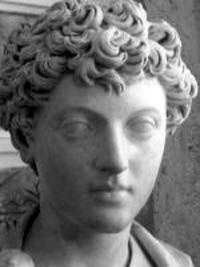
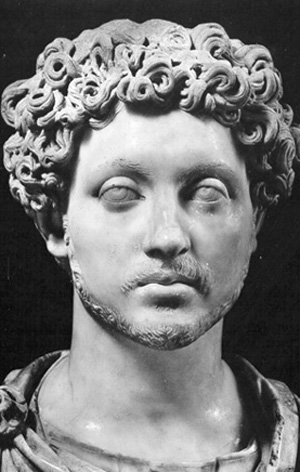
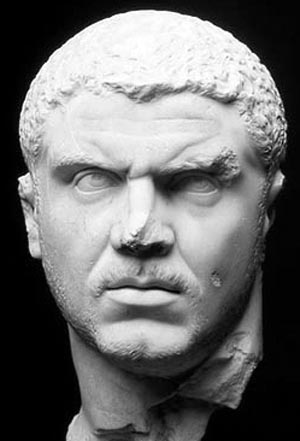 I
I
